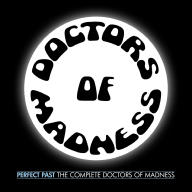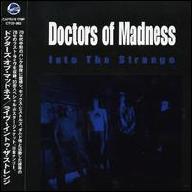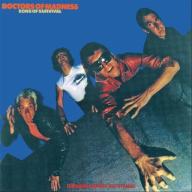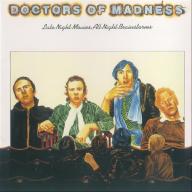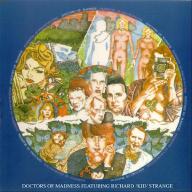The Doctors of Madness were formed in 1975 from the wreckage of Great White Idiot, a band whose one live show, at London's 100 Club, ended when the audience realized that the advertised Soul Night was not now taking place. The original lineup of vocalist Richard Harding, guitarist Eddie Macaro, keyboard player Martin Martin, drummer Peter Hewes, and violinist Geoffrey Hickman, plus a now forgotten bassist, did little before disputes over the band's future direction saw the bassist replaced by Colin Bentley. Martin and Macaro also departed and by year's end, the group was rehearsing at a south London pub, the Cabbage Patch.
There, a defining band direction was forged around Harding's increasingly cinematic, distinctly Dylan/Lennon/Lou Reed-influenced lyrics -- the Doctors' early live set included stylized renditions of both Dylan's Ballad of a Thin Man and Reed's Waiting for the Man -- and a healthy respect for the rock theater which was then in vogue. By the time impresario Justin DeVilleneuve encountered the group, the four band members had already adapted both the names and the image which would characterize the Doctors of Madness: Harding became the blue haired, platform-booted Kid Strange, Bentley was reborn as the skeletal Frankenstein Stoner, Hewes became Pete DiLemma, and Hickman was now Urban Blitz.
With former Syd Barrett manager Bryan Morrison joining DeVilleneuve at the managerial helm, the Doctors made their public debut on model/actress Twiggy's own television show in early 1976 (DeVilleneuve also handled her career at that time.) It was an auspicious debut, highlighted by Strange and his hostess duetting on one of the Doctors' more balladic numbers.
From the outset, however, the media regarded the Doctors with suspicion, a sensitivity which wasn't helped by the wild rumors which management were flinging into the marketplace. A much-heralded appearance at the Great British Music Festival ended in disarray when the band's PA broke down, while a U.K. tour with Be Bop Deluxe saw audience's treat the group with rabid hostility. The animosity reached the U.S. as well -- reports that NBC was planning to make a documentary on the group were crushed when the network instead aired a magazine segment titled #How to Hype a Band in Britain.
The March 1976, release of the Doctors debut album, Late Night Movies, All Night Brainstorms did little to reverse the trend, while their first headlining tour, the fall 1976 End of the World tour, was widely condemned as an overblown extravaganza of sub-Alice Cooper theatrics. Still, the band's second album, Figments of Emancipation, made a welcome Christmas present for the few hardy souls who did care about the band, while it also made an appearance in the U.S., paired with its predecessor across an eponymous double album.
The Doctors gigged through 1977, but released nothing new until early 1978 brought their third album, Sons of Survival, a set highlighted by the band's first-ever single Bulletin and Back From the Dead, a song co-written by Strange and the Adverts' TV Smith. (The Adverts' own version appeared later in the year on the B-side of their Television's Over single.) It was one of some 20 songs composed by the pair during this period, but the only one to have seen release.
Urban Blitz quit the band shortly after the album's release; he was replaced, strangely, by the Damned's vocalist Dave Vanian and, in this form, the Doctors cut a new single, another TV Smith composition titled Don't Panic England. Polydor not only rejected the single, they also dropped the band and, in October, the Doctors of Madness announced their demise. The group bowed out with a final show at London's Music Machine on October 26, featuring guest appearances from both TV Smith and Dave Vanian, and a two-hour show which traced the band's entire career.
Stoner promptly joined the Sadista Sisters before reuniting with TV Smith in TV Smith's Explorers following the Adverts November 1979 breakup. As Richard Strange, Strange launched his own solo career, also opening the now legendary Cabaret Futura as a testing ground for many of the bands and personalities who would soon be filling the Futurist ranks.
The Doctors themselves enjoyed a massive revival in 1981, a period which peaked with the release of the Revisionism compilation; since that time, all three of their original albums have been reissued on CD in Japan, although their debut alone is available on the U.K. independent Ozit label. ~ Dave Thompson, Rovi


